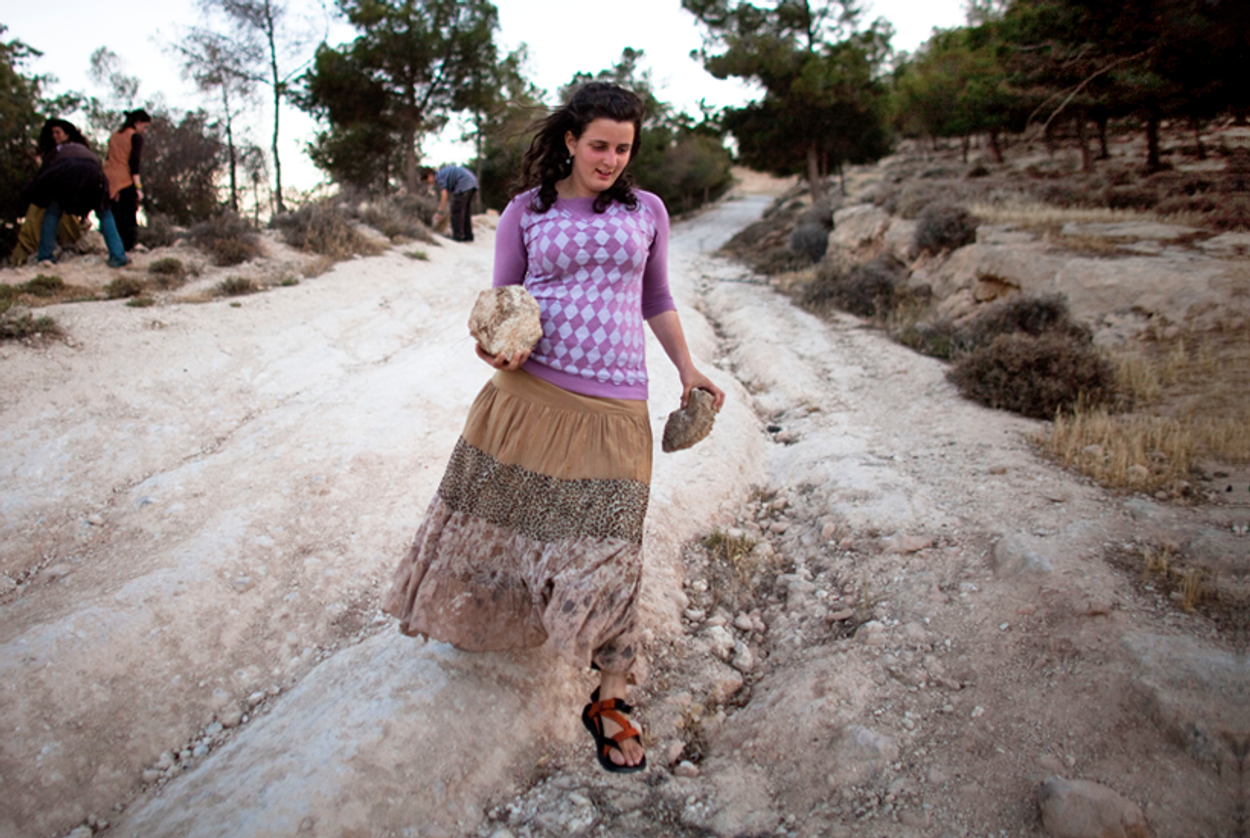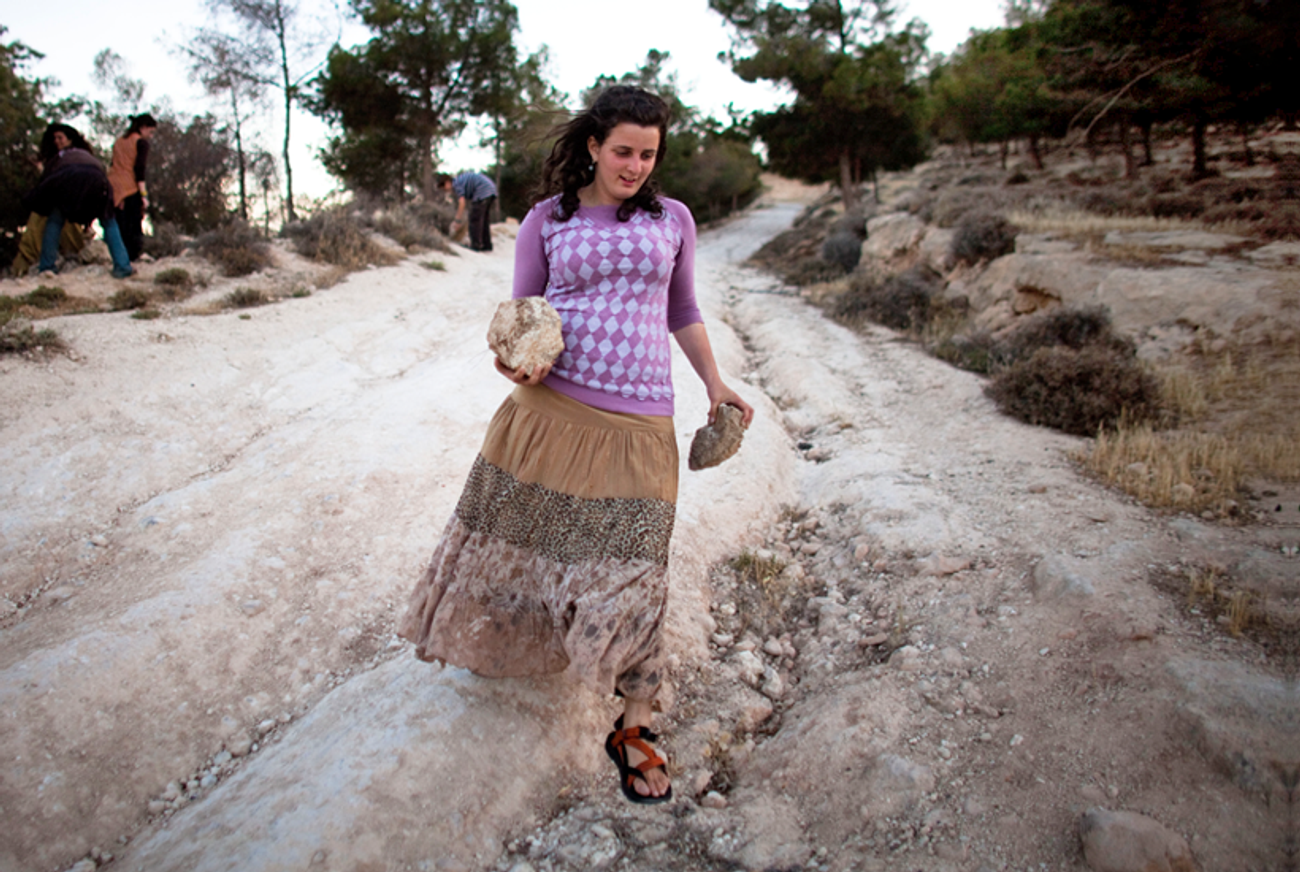The Great Israeli Novel Smiles at the Settlers
With his newly translated novel ‘The Hilltop,’ Assaf Gavron stakes his claim to be Israel’s Jonathan Franzen




American readers have only a limited sense of what’s really going on in Israeli literature. The Israeli writers who are regularly translated into English—Amos Oz, A.B. Yehoshua, David Grossman—are now in their sixties and seventies, and they continue to form our expectations of what Israeli fiction should sound like: elevated, literary, engaged with the Jewish past, unmistakably serious. Of the younger generation of Israeli writers, we know Etgar Keret and not much more. Certainly Assaf Gavron, whose novel The Hilltop was an Israeli best-seller and prize-winner, is not a familiar figure here. Yet Gavron turns out to be a natural fit for an American readership. Born in 1968, he has been a rock musician and a video game creator, as well as a prolific translator of American fiction (he brought Portnoy’s Complaint into Hebrew).
The Hilltop, just published in a vigorous and colloquial English translation by Steven Cohen, is a “great Israeli novel” in much the same way that Jonathan Franzen’s Freedom was a “great American novel.” Like Franzen, Gavron writes realistic fiction with a comic edge that aims to take the temperature of his whole society, to tell us how Israelis live now. Accordingly, The Hilltop embraces all the archetypal settings of Israeli life—the kibbutz, the nightlife of Tel Aviv, even the obligatory stint living among other Israelis in New York. The center of the action, however, is the hilltop settlement of Ma’aleh Hermesh C, a tiny outpost in the West Bank, where a group of intrepid and blinkered Jews are trying to create a community of their own.
Religious Jewish settlers in the West Bank are not a group that gets a lot of sympathetic press in the West. They tend to be portrayed largely as fanatics and colonizers, whose reckless annexation of Palestinian land creates obstacles to a two-state solution. Politically, there seems little doubt that Gavron, too, is opposed to the settler movement; indeed, one way of reading The Hilltop is as a cutting satire of the way Israeli government and society colludes with the settlers. The opening chapter of the book explains how Ma’aleh Hermesh C came into existence, when a resident of a more established settlement—Othniel Assis, a farmer from the original Ma’aleh Hermesh—decides he needs more land for his crops. Without asking anyone’s permission, he begins growing vegetables on land that turns out to be part Palestinian owned and part Israeli nature reserve. Then he brings in a trailer to live near his farm; then he invites some like-minded Jews to live in a few more trailers.
Legally, Othniel doesn’t have a leg to stand on, and he receives repeated warnings from government agencies to evacuate. But at the same time, Gavron shows, the settler movement has powerful allies and sympathizers, including some in the government and the army. With their help Othniel succeeds in defying the law to create “facts on the ground”:
The Amidar housing company was then free to move additional trailers to the site.
And the Postal Authority had a green light to set up a mail-distribution post.
And the National Infrastructures Ministry could instruct the Public Works Department to make good use of days when Civil Administration officials weren’t patrolling the area, to lay down some asphalt.
And the Agriculture Ministry was able to approve Othniel’s status as a farmer and his eligibility for water quotas at a reduced cost.
Before anyone in charge realizes what’s happened, Ma’aleh Hermesh C has become a thriving community of about a dozen families, who see living in historic Judea as both a religious virtue and a Zionist achievement. These families make up the cast of The Hilltop, and by taking them as his characters, Gavron prevents us from seeing them as mere political villains. They are, of course, chauvinistic and indifferent to Palestinian rights. That comes across in a bluntly ironic scene where the IDF tries to run the controversial “security wall” through land belonging to Ma’aleh Hermesh C. and its neighbor, the Arab village of Kharmish. “How is that possible?” asks Othniel indignantly. “Since when have they been building the fence through Israeli settlements? Haven’t they heard of democracy and human rights over there in Jerusalem?” The dark joke, of course, is that the settlement only exists because of Othniel’s own indifference to the rights of the Arabs, whose land he is squatting on.
Yet it is very easy for the settlers to forget that fact. Altogether, the hilltop’s inhabitants are strikingly normal; they are mainly concerned, not about politics or religion, but about jobs and marriages and children. At one point, a secular Israeli from Tel Aviv makes his way to the settlement and looks around with dread: “Tell me, are they not lunatics, burning with messianic ideological fervor, outlaws and bullies who harass the Arabs and steal land and all that?” In a sense, that’s just what they are—the settlement is built on stolen land, and later in the book a group of settlers will launch a nighttime reprisal raid on Kharmish, burning a stand of olive trees. But “most of the people here,” the visitor is told, “simply get on with their own lives,” and that is also part of the truth. If the settlers are dangerous, it is because of their belief that it’s possible to live a normal life in the middle of a battleground.
But then, how could the State of Israel itself exist if its original pioneers hadn’t dared to do exactly that? At several moments in The Hilltop, Gavron draws a parallel between the Occupied Territories and the Wild West: Not just because both are lawless, but because settling “empty” land is as central to Israeli identity as it once was to American identity. For some of the Jews in Ma’aleh Hermesh C, living in the West Bank is a way to relive the glory of the early days of Zionism, to share in the sense of sacrifice and adventure that seems to have vanished from bourgeois, urban Israel.
Roni and Gabi Kupper, the brothers who emerge as the novel’s main characters, discuss this question and reveal their different personalities in the process. Gabi, who has changed his European last name for a Hebrew one, Nehushtan, is one of the true believers of Ma’aleh Hermesh C. A loner with a troubled past, Gabi has found peace in religion and is an ardent devotee of the Hasidic mystic Nachman of Breslov. He spends his days building himself a cabin near a stream, getting as close to the land as he possibly can. His life is upset, however, when his older brother Roni arrives, evidently trailing his own troubles behind him. Roni is as secular and worldly as Gabi is withdrawn and pious, and the two brothers quickly get on each other’s nerves.
In one conversation, Gabi and Roni debate what it means to live an authentically Israeli life. For Gabi, it means living peacefully in the Holy Land, close to God. But Roni longs for something more strenuous and heroic, more in the spirit of Herzl and Ben Gurion. “We have a country, which works well, and … there’s no longer any need to fulfill the Zionist dream, there’s no need any longer to survive the Holocaust. So, why shouldn’t we simply enjoy it and that’s it?” Roni asks. But he can’t be content with mere happiness: “OK, so they built a country and did great and historical things that we will never do. But that doesn’t mean I cannot fulfill myself on a personal level and do something with my life.”
The big question, however, is what kind of life contemporary Israel makes possible for the dedicated and ambitious. The second half of The Hilltop moves away from Ma’aleh Hermesh C and delves into the past of Roni and Gabi, showing how their lives led them to the settlement. The brothers grew up as orphans on a kibbutz, and Gavron adds to the extensive Israeli literature of unhappy kibbutz childhoods. Gabi, in particular, is a troubled child, whose quick temper leads him to acts of disturbing violence—for instance, jumping on a younger child and breaking his jaw. As he grows up, this temper gets him kicked out of the army and then ruins his marriage, when he starts to take out his rage on his own young son. For Gabi, clearly, the hilltop with its ordered, pious existence is a refuge from himself. “I realized that there is someone who directs things, otherwise it couldn’t happen, otherwise living would be impossible,” he confesses. “And the moment I realized that, suddenly everything fell into place.” The settlement is ideologically the polar opposite of the secular, socialist kibbutz, but Gavron shows that they are emotionally similar: Both are idealistic enterprises that promise to elevate their members above the workaday world.
Roni, on the other hand, goes out into the world and tries to conquer it, though he never quite manages to do so. He is accepted into an elite army unit but fails the training; then he finds his way to Wall Street and becomes a trader but loses a fortune and has to come home in disgrace. In telling his story, Gavron draws wry sketches of the lives of Israeli go-getters, especially the ones who come to America to network their way to success. In the end, Roni remains too restless and worldly to be content in the tiny world of Ma’aleh Hermesh C. No sooner has he arrived than he begins scheming with an Arab olive-grower to produce a new line of olive oil for sale in chic Tel Aviv boutiques.
As the novel hurries toward its climax, troubles rush in from all sides. The American ambassador gets word of the illegal settlement and demands that something be done about it; Roni’s olive oil scheme comes up against a giant Japanese corporation that is trying to corner the market in West Bank olives; Gabi begins to fall in love with a divorced woman neighbor. The personal and public strands of the story intersect in its grand final scene, a Purim party that turns into a complicated disaster, with costumed people running amok: “Pippi ran this way, and the space shuttle that way, and Bigfoot another way. … Herzl shook his head in disbelief over the shattering of the dream, and the infant rock band burst into a coordinated symphony of howls.” This is Gavron’s way of wringing comedy out of a denouement that another novelist might turn into a tragedy. But then, The Hilltop maintains its composure and hopeful good spirits throughout, even when dealing with the gravest problems in Israeli society. Indeed, Gavron offers a welcome antidote to the panic and pessimism that informs so much American Jewish discourse about Israel. Despite everything, he suggests, there is room for hope, for laughter, and for sheer ordinary life.
Adam Kirsch is a poet and literary critic, whose books include The People and the Books: 18 Classics of Jewish Literature.